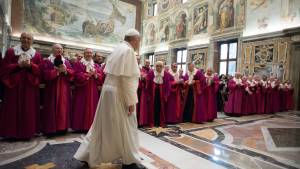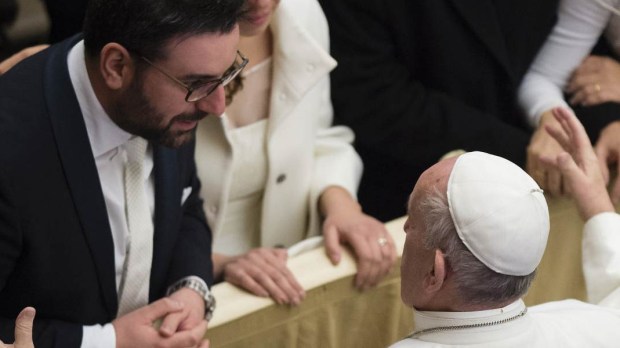At Wednesday’s weekly audience on the 6th Commandment, Pope Francis again called for stronger marriage preparation within the Church. In doing so, he used a term central to the Church’s understanding of spiritual formation.
The Holy Father said:
To enter the Sacrament of Marriage, the engaged couple must ripen the certainty that in their bond there is the hand of God, Who precedes them and accompanies them, and will allow them to say: “With the grace of Christ I promise to always be faithful to you.” They can not promise fidelity “in joy and pain, in sickness and in health,” and to love and honor each other every day of their lives, only on the basis of good will or hope that “the thing works.” They need to build on the solid ground of God’s faithful love. And for this, before receiving the Sacrament of Matrimony, we need careful preparation, I would say a catechumenate, because we stake our whole life in love, and one does not joke with love. Three or four meetings in the parish cannot be defined as a “preparation for marriage”; no, this is not preparation; this is a false preparation. … The preparation must be mature and it takes time. It is not a [mere] ceremony; it is a Sacrament. But one must prepare with a true catechumenate.
What does the Holy Father refer to with catechumenate, and why does the Sacrament of Matrimony need one, in the estimation of the pope?
The word catechumenate refers to one of the periods within the Church’s process of bringing adult converts into the Church, the Rite of Christian Initiation for Adults. The ancient Church had a lengthy process of gradual initiation for new members, in which they would be introduced to the mysteries of the faith and slowly integrated into the life of the community. These initiates were called catechumens, Greek for “learner.” For part of that time they would not even be allowed to remain in church for Mass beyond the homily—thus the two halves of the Mass used to be called the Mass of the Catechumens and the Mass of the Faithful.
Over time, the Church’s process for bringing people into communion with the Church became much less formal—often a few meetings with Father in the rectory, followed by making a profession of faith and the reception of whatever sacraments one needed. But at the Second Vatican Council, the bishops called for a revival of the Church’s ancient practice, and within a few decades, the RCIA we have today was in place.
Now, when prospective members approach the Church, they progress through a series of periods of initiation. After an initial phase of inquiry and evangelization, they enter the catechumenate, a phase which can last up to several years and in which they learn about the teachings and practices of the Church.
The catechumenate, in a sense, is where people learn how to see the world with Catholic eyes.
The fact that Pope Francis has called for a sort of catechumenate for marriage — an extended period in which the engaged couple would be educated in the Christian view of marriage and guided into living marriage in a Catholic way — should not be surprising.

Read more:
Pope reveals most important virtue for marriage
The General Directory for Catechesis says that “the model for all catechesis is the baptismal catechumenate” (paragraph 59). The preparation for every sacrament involves some catechesis, some education in and “echoing” of the faith. The Church recommends that every stage of learning about the faith follow this model of entering into the “school of faith,” sitting at the feet of Christ the teacher (Christus magister) and learning about God’s plan for our lives.
Pope Francis is calling for us to reconsider our view of marriage preparation. It reminds me of the recommendation I heard a priest make years ago: to have couples come to the Church before they even become engaged and discern together with the Church whether they ought to get married. (Think of this as the marriage “inquiry” period.) At that point they could set out to become matrimonial catechumens and prepare to become “initiated” into this sacrament.
It’s a radical suggestion—but most good ones are.

Read more:
Pope Francis calls for faith formation “before and after marriage”
See the Holy Father’s series on The Commandments here:
Pope points out what God says BEFORE he gives the Commandments
You probably don’t think of the 10 Commandments like this! Check out the pope’s amazing insight
Pope: Are you making yourself a human sacrifice to your idols?
Taking the name of the Lord in vain is much more than “OMG,” explains Francis
Vacation wears us out because we don’t know how to rest: Pope gives the answer
Pope explains how to find rest when you’re a slave to yourself
Scarred by your parents? Pope explains why you should still honor them
Abortion is like hiring a hitman, says pope in strong defense of 5th Commandment

